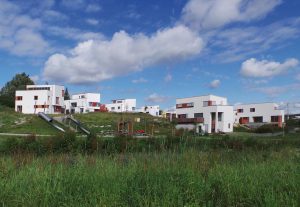"Cars have no place in cities"
Hermann Knoflacher with Vladimir Balzer and Axel Rahmlow
Hermann Knoflacher wants roads and car parks to be built on. Car-free cities are feasible, says the transport expert. This would allow local authorities to create masses of affordable living space. But will they go for it?
Affordable housing in cities is becoming increasingly hard to find. Many feel pushed to the margins. Politicians want to take countermeasures, but have very different mechanisms depending on the country and the municipality.
www.deutschlandradiokultur.de/parkplaetze-weg-wohnraum-her...
Keywords: Bike-/Velo-City, DE-News, Mobility, Transition Town, Environmental policy, Housing policy


